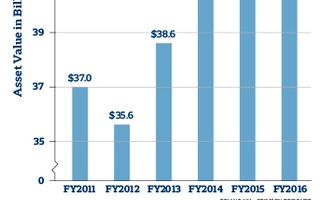{shortcode-957b68d209993ddb5fb1fe01e886ebd9835d0eaa}
UPDATED: October 9, 2014, at 1:10 a.m.
Eliot’s House committee plans to spend about $120 per undergraduate resident this year, while Adams’ House committee intends to spend about $70, a Crimson analysis of recently disclosed House budgets found.
The analysis is based on House committee budgets published for the first time by the Undergraduate Council on Monday, in accordance with the Council’s bylaws. They indicate disparities in the ways different House committees raise and spend their funds on activities and events.
The highest projected revenue among those who submitted budgets is that of the Eliot House Committee, which estimates a yearly revenue of about $65,000, including a roughly $5,000 surplus from the prior fiscal year. Only about $54,000 of the total is expected to be spent throughout the year; about $5,000 will be given to charity.
Other Houses planned on less revenue, the reports show. Lowell and Adams House committees estimate budgets of about $30,000 each, while Kirkland and Quincy detailed projected budgets hovering around $40,000 each.
The remaining budgets only detailed revenue for the fall semester. They range from about $10,000 for Mather and Pforzheimer to about $15,000 for Currier and Leverett and around $17,00o for Winthrop and around $20,000 for Dunster and Cabot.
These Houses appear to have not submitted budgets in compliance with the UC bylaws, which require a full year’s budget and projected revenues. The Council, however, held an emergency online vote Tuesday night that will result in full funding for all Houses, UC President Gus A. Mayopoulos ’15 said.
“We’d be placing technicalities over the spirit of the legislation by not funding them,” Mayopoulos had said ahead of the vote.
All House committees share similar revenue sources from the Office of Student Life and the UC. Many, however, differ in the amount they intend to raise and spend on House formals and merchandise, according to the budgets.
Eliot House, for example, plans to raise about $25,000 in ticket sales for all of its formals and soiree, and spend about the same amount on its premiere formal—Eliot Fete. Kirkland House committee intends to raise a smaller figure, about $7,000, on ticket sales but spend $21,000 on its spring formal. Other Houses, like Lowell and Adams, intend to expend about $10,000 or less on a similar event.
Meanwhile some Houses, including Quincy and Eliot, estimate more revenue from laundry costs, amounting to about $9,500 or more for the year, compared to other Houses such as Pforzheimer or Mather Houses, which predict about $2,500 in laundry revenue for the fall semester alone.
Those disparities, almost 20 years after the College instituted the housing lottery, have some worrying that House committee revenue streams could further perpetuate inequalities they see among the Houses.
“I don’t think it makes sense that House life is touted as a cornerstone of the Harvard experience, but yet there are huge disparities in the type of programming that can happen for various Houses,” former UC President Tara Raghuveer '14 said. Differences in House committee budgets, she said, could perpetuate this inequality.
Pforzheimer House Committee treasurer Joseph F. Tabasco '15 appeared surprised when told how Eliot’s projected yearly revenue of about $65,000 compared to his House’s fall semesterly revenue of about $13,000.
Read more in College News
Students Criticize Response to Emailed Death ThreatRecommended Articles
-
Housing Budget Cuts ContinueWhile administrators and tutors can speak at length about how the limited effects of the cuts, no one is certain as to when they will end—and given history and future plans, that end may not come anytime soon.
-
Following Evaluation, House Budgets See IncreasesHouse budgets have been modestly increased by five percent or less this year—with Quad House budgets increasing the most—due to an extensive evaluation of House finances initiated in the midst of the financial crisis.
-
FAS Hopes For Increased Endowment FundingSenior administrators in the Faculty of Arts and Sciences have provided loose guidelines to departments for long-term financial planning that foresee a growth in the distribution from the University endowment to pre-2008 nominal levels by 2018.
-
Better Understanding Harvard’s Finances
-
 University Budgets Potentially ‘Constrained’ For Years To Come, Report Warns
University Budgets Potentially ‘Constrained’ For Years To Come, Report Warns













